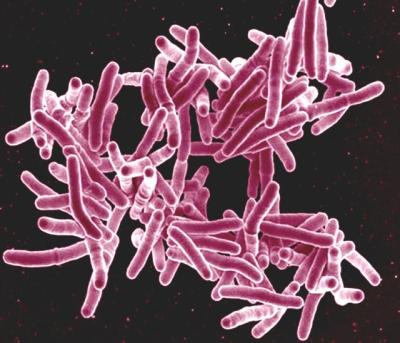April 6, 2022

Scanning electron micrograph of Mycobacterium tuberculosis bacteria, which cause TB.
The National Institute of Allergy and Infectious Diseases (NIAID), part of the National Institutes of Health, today announced four new grant awards to establish Tuberculosis Research Advancement Centers (TRACs). The centers will support the development of a next generation of tuberculosis (TB) researchers by providing focused mentoring and funding support for new investigators; opportunities for multidisciplinary and collaborative research; and training in laboratory and clinical settings. The total funding in the first year of these five-year grants is approximately $4.3 million.
TB is a bacterial disease that currently is the second leading cause of death, after COVID-19, from a single infectious agent worldwide. In 2020, as many as 10 million new TB cases were diagnosed and approximately 1.5 million lives were lost to the disease. Alleviating the global burden of TB through research to discover or improve diagnostics, therapeutics and vaccines is a top priority for NIAID, as outlined in the 2018 Strategic Plan for Tuberculosis Research.
Awards have been made to the following institutions:
Texas Biomedical Research Institute, San Antonio
Principal Investigator: Larry Schlesinger, M.D.
Grant P30AI168439-01
The Interdisciplinary NexGen TB Research Advancement Center (IN-TRAC) will support career development, and provide experiential training in biosafety and biocontainment training, animal models, and animal imaging modalities. Participants will be trained in TB clinical research and TB patient care at the only free-standing TB hospital in the United States (Texas Center for Infectious Disease, San Antonio) and at clinics and field sites along the Texas-Mexico border.
Johns Hopkins University, Baltimore
Principal Investigators: Petros Karakousis, M.D., and Richard Chaisson, M.D.
Grant P30AI18436-01
Working with partners and collaborators at clinical sites in Baltimore and internationally, the Johns Hopkins University (JHU) TRAC will enhance the integration, productivity and impact of JHU’s existing TB research programs and foster career development. The JHU TRAC will also support clinical, basic and computational TB research through services provided via four research cores: a clinical core; a microbiology, immunology, animal modeling and imaging core; a pharmacology and pharmacometrics core; and a bioinformatics, modeling and biostatistics core.
Emory University, Atlanta
Principal Investigators: Neel Gandhi, M.D., and Jyothi Rengarajan, Ph.D.
Grant P30AI168386-01
The Emory/Georgia TB Research Advancement Center (TRAC) and partner institutions will support career development and provide Center participants with access to study populations in the United States and in countries with a high burden of TB. This TRAC will also provide resources for studies in pathogenesis and host immunity in animal models, including research with non-human primates. It will also offer opportunities to use cutting-edge technologies and integrate systems biology into experimental design.
University of Washington School of Medicine, Seattle
Principal Investigators: Chetan Seshadri, M.D., Rhea Coler, Ph.D., and David Sherman, Ph.D.
Grant P30AI168034-01
The Seattle Tuberculosis Research Advancement Center (SEA-TRAC) will catalyze new avenues of research and train new investigators to make a meaningful impact on the TB epidemic. The Development Core will oversee educational, training and grant programs designed to foster career development of junior or senior investigators who are new to TB research. The Clinical and Translational Science Core will lead training and consulting in clinical research methodology and foster collaborative research with international partners. The Basic Science Core will provide training for scientists new to working in the Biosafety Level-3 (BSL-3) environment and will lead training and consulting in advanced microbiology and immunology methods. The Data Sciences Core will leverage strengths in biostatistics, computational biology and modeling to train scientists who are new to data science and will offer consulting services for advanced research questions.
WHO:
Lakshmi Ramachandra, Ph.D., chief, Tuberculosis and Other Mycobacterial Diseases Section, Division of Microbiology and Infectious Diseases, NIAID, is available to discuss the TRACs program.
Contact
To schedule interviews, contact:
Anne A. Oplinger
(301) 402-1663
NIAIDNews@niaid.nih.gov

